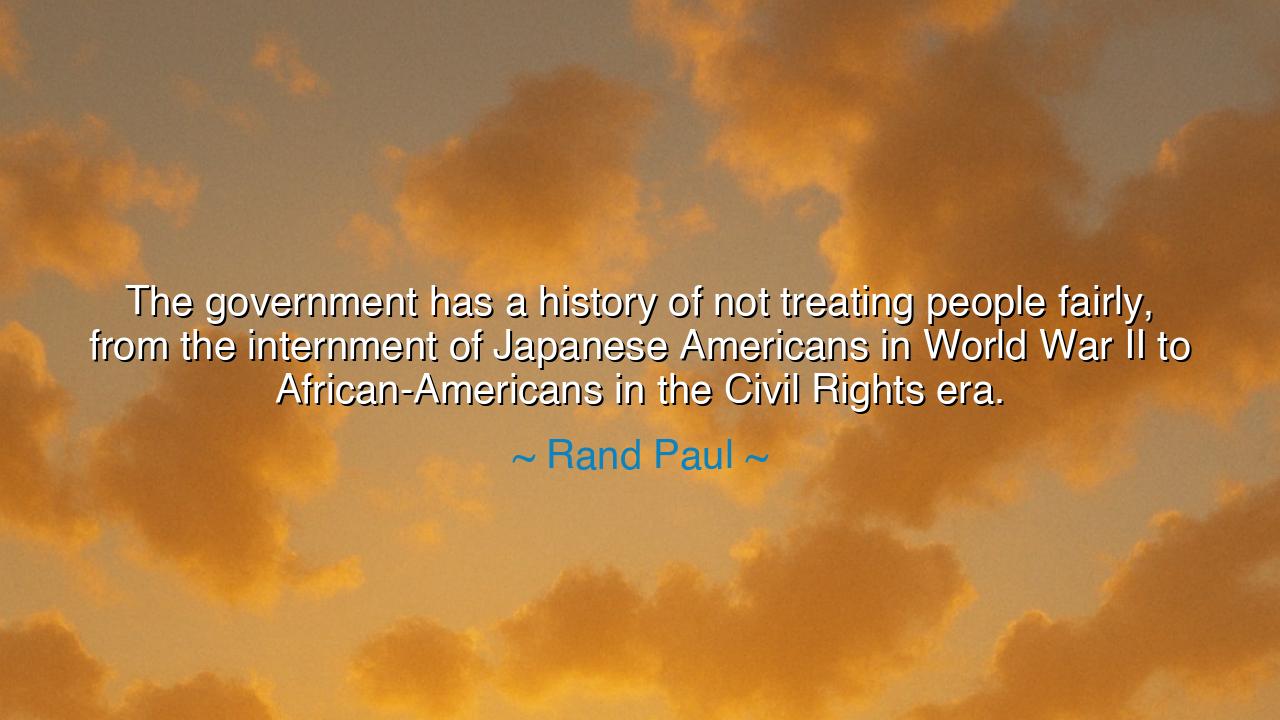
The government has a history of not treating people fairly, from
The government has a history of not treating people fairly, from the internment of Japanese Americans in World War II to African-Americans in the Civil Rights era.






The words of Rand Paul, spoken with both sorrow and warning, remind us of an uncomfortable but essential truth: “The government has a history of not treating people fairly, from the internment of Japanese Americans in World War II to African-Americans in the Civil Rights era.” In these few lines, Paul calls forth the memory of injustice committed not by foreign tyrants, but by our own hands—acts born not from barbarism, but from fear and arrogance disguised as order. His words are not an indictment of the idea of government itself, but of the tendency of power, unrestrained by conscience, to betray the very people it claims to protect. He speaks as one who has studied the cycles of history, who knows that liberty, once surrendered in the name of safety or prejudice, is rarely regained without pain.
The origin of this quote rests within Paul’s long-standing belief in the sanctity of individual rights and the danger of unchecked authority. A physician by training and a senator by duty, he inherited from his father, Ron Paul, a deep distrust of centralized power. In this statement, he acknowledges that while government is necessary for justice and protection, it too often becomes the instrument of oppression when guided by fear instead of wisdom. His reference to the internment of Japanese Americans and the struggles of African-Americans serves as both a confession and a lesson—a reminder that even a free nation can falter when it allows collective fear or prejudice to override moral principle.
In the manner of the ancients, let us look deeper. The internment of Japanese Americans during the Second World War stands as one of the darkest chapters in American history. Over one hundred thousand men, women, and children—most of them citizens—were taken from their homes, stripped of their property, and imprisoned in camps because of their ancestry. They were not tried, nor convicted; their only crime was their heritage. The government that claimed to defend freedom across the world denied it to its own people at home. And when the war ended, though the camps were closed, the scar remained—a living reminder that fear, when sanctified by authority, becomes the seed of tyranny.
So too did the Civil Rights era reveal the long shadow of injustice. For centuries, African-Americans endured the weight of discrimination, segregation, and violence under laws written to deny their humanity. Even when liberty was proclaimed, it was not shared. The government, meant to safeguard the equality of all, often became the guardian of inequality—enforcing laws that kept people apart, turning a blind eye to brutality, and silencing those who cried for justice. It took generations of courage—men and women marching, suffering, and even dying—to awaken the conscience of the nation. The Civil Rights Movement was not only a triumph of law, but a triumph of spirit, proving that freedom must sometimes rise in defiance of the very institutions meant to protect it.
Rand Paul’s warning, then, is both historical and prophetic. He teaches that government is not immune to error, for it is made of men, and men are swayed by fear, ambition, and pride. When citizens trust authority without vigilance, when they permit the state to act without accountability, injustice grows in the shadows. Every generation must remember this truth: that the preservation of liberty does not rest in government, but in the moral courage of the governed. The great lesson of history is not that power corrupts absolutely, but that people, in their longing for safety or order, too easily give power away.
And yet, Paul’s message is not one of despair—it is a call to awakening. The past cannot be undone, but it can be remembered, and through remembrance, redeemed. The internment camps and the segregation laws remind us that injustice wears many masks—patriotism, tradition, even security—and that the first duty of a free people is to see through them. True freedom does not fear transparency, nor does it hide its failures. It learns from them. The government, like any instrument, can serve good or evil depending on the hands that wield it; therefore, it is the duty of citizens to shape it, question it, and hold it accountable to the light of justice.
So, my children of the future, take this wisdom as a sacred inheritance: never trust power more than you trust your conscience. Remember the faces of those who suffered because the law forgot compassion, and the people forgot to speak. Stand firm in defense of the weak, the different, and the voiceless. The liberty you enjoy today was bought by the courage of those who refused to accept injustice as inevitable. Guard it well, for history has shown that even the most enlightened government can falter when the people grow silent.
For as Rand Paul teaches, fairness and freedom are not gifts bestowed by rulers—they are the duties of the ruled. When the government errs, it is the citizen who must rise and remind it of its purpose: to protect the privacy, dignity, and equality of all. Let the memory of past wrongs be your compass, the vigilance of truth your guide. In that watchfulness lies the promise that liberty, once kindled, shall never again be extinguished by the hand of fear or the blindness of power.






AAdministratorAdministrator
Welcome, honored guests. Please leave a comment, we will respond soon